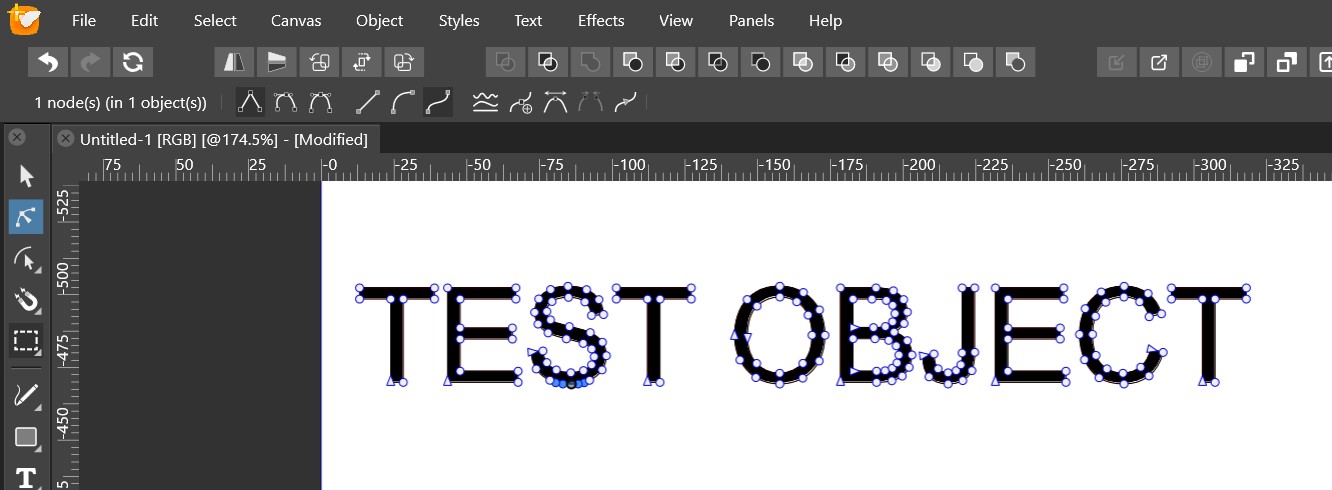-
Posts
32 -
Joined
-
Last visited
Everything posted by Joao Silva
-
Humm... just found on reddit.. that if the objects are placed inside each other.. the bigger one is considered as "key" object. Well.. after a few tests i confirm that it does work like this. But.. what if i want it the other way around? Or if all objects are of the same size? Is there any documentation on this?
-
Is there any way to manipulate several node's control handles in a single swipe? i mean... there are situations that, for symmetry or coherence sake, we need to manipulate several nodes the same exact way on their control handles. I am trying to figure out a way to do this.. but.. no luck.. Something like.. just selecting the control handles .. .. anyone?
-
Hum... i have just realized that it is holding the nodes but not in a standard format or so it seems (maybe i am doing something wrong.. maybe i am not). Let me explain it further... Lets assume that I am copying a vector object on AD and pasting it to a external program. While it is true that in some programs the nodes are accepted.. in orders.. the nodes just come as a full raster type object (pixel) and not vectors. For instance, in order to replicate this follow these steps : 1) Open AD and edit an object. 2) Copy the object 3) Open 3rd party software such as VectorStyler (free beta for windows) 4) Paste clipboard contents (works fine.. the nodes are pasted) 5) Open standard legacy software Serif Draw Play x8 and paste clipboard contents (does not work.. the contents are not recognized as vector nodes, and the clipboard contents are pasted as raster) As it seems this anomaly occurs not only of the legacy software but also in other several programs such as figma (not tested by me though).. which makes me think that something on the clipboard copy procedure is not catching the nodes in a standard form. However... If i am to copy a SVG from the legacy software (Draw Plus x8) and then paste it in the Affinity Designer area.. the nodes are fully recognized and the vector object is pasted. This makes me think that something is not standard on the "copy" routine on AD... Give it a check to the attached images that illustrate the passage of vector objects from Affinity Designer to other software packs (works partially).. and from a legacy software pack such as Draw Plus to Affinity Designer (works ok). Is it related to SVG file format versions (such as 1.1 or 2.0)?
-

How to flip Ruler scale
Joao Silva replied to Parmanand's topic in Feedback for the V1 Affinity Suite of Products
So... no news yet?- 12 replies
-
- reset ruler origin
- flip ruler scale
-
(and 1 more)
Tagged with:
-

Shape builder tool
Joao Silva replied to telencephalon's topic in Pre-V2 Archive of Desktop Questions (macOS and Windows)
I really dont know why this isn't on Affinity Designer.. this tool was present on the legacy product (Draw Plus). I do have a licensed copy of the Draw Plus.. and in many occasions it is quite useful as to achieve the same result in the geometry nodes there is a lot of tinkering (it depends on the design in question).. not only that .. but the legacy product also has the auto-trace feature... so.. if this was already implemented on legacy versions.. why not on this one? -
Yes.. that is a way of doing it with some degree of control... however.. still it will require to the operator to manually place every single "object" in order to achieve the result. Now imagine a situation that you already have the design done.. and all objects are already placed. deleting those and redesigning all with a custom brush is not a option for two reasons : 1) Time consuming; 2) The altered design will have the placements (original XoY coordinates) all messed up (which is more important)..
-
It seems like the Mesh Warp Tool has some sort of bug on AP 1.9.1.979 (it's latest release). Whenever i use it the the tool the software becomes unresponsive.. tested multiple times. This does not happen on 191.979 (Beta) version... ( i know.. its the same version number.. except one is beta and the other one is not.. but it is what its on their description) No hardware acceleration is active.
-
You dont understand.. either because you dont want to.. or i am not explaining myself well.. or my english is like chinglish... or because you dont manage to achieve it. So .. let me rephrase this... The brush jitter does allow rotation.. size.. etc... i am well aware of this. How that works is not exclusive to Affinity (or Serif) and has many many years since it was initially implemented.. however when you are placing the "custom" brush you dont have any possible choice on where the parts will be placed.. they will be placed in a "just random" way. I was referring to a certain degree of randomness.. not "total" randomness.. for that.. i already have that obvious tool spec. If one would have a jitter on the contextual panel about the scale and rotation on seperate object manipulations you would be able to keep the objects in place and then have some randomness on the size and rotation (for example) on the already placed objects. Maybe you dont have any applications for this.. but i, using vector edition software for quite a long time now (20+ years).. do have many. By the way... i also am a software developer and am well aware of how difficult this might be to implement. It is just a suggestion.. by no means i am forcing something whatsoever...
-
I understand your point.. but it is not the exact same thing. You have no control on the nesting nor do you have the control on the proximity.. it's just random! If this is to used for decal or vinyl cut production (as many here use vectors for) then, the brush trick, although it can manage to do it.. is clearly insufficient. If you are placing a matrix of these object inside a container.. then it all goes off... yeah.. i know what you mean.. but it sure isnt the same thing.. not for a mile away.
-
Those are jitters for the brushes not for independently modified objects. The idea behind this is to have some degree of randomness on the manipulation of multiple selected objects that have the separately transforms activated on them. To use the jitters on the brushes creates randomness but it has low degree of control. To say it in other other words .. these jitter controls would create a controlled chaos on the multiple object manipulations. Check the attached example for further reference...
-
You know what would come in handy ? A jitter control such as in brushes for transforms on multiples objects that are selected as "separate transforms". A jitter control for scale and rotation speed/angle would be nice as it would allow to us to make some randomness. This is actually more useful than one would think to.. So.. that's a suggestion .. Kind regards to all.. Cesar
-
Well.. try to replicate this. Apply a live filter like distortion to an object (let's say... a dotted XoY plane).. then.. scale this object after the live filter has been activated! Artifacts should be poppin like.. leprechauns at the end of the rainbow... As far as i can see.. it seems to me like the yser-invisible mesh used for the live filter is not updated with the upscale or downscale of the object resulting in this (gaps, distends or overlaps). This seems like a core error.. not a graphical card issue.. but.. i might be wrong.. This however does not happen on the newest beta. So.. they probably fixed this scaling issue already. I will be using the beta a checking for further errors...
-
Well... i have not yet. Sure.. why not? I will give it a few hours now as i will be doing some work with it.. and will report later on..
-
Here.. take a look at this.. just happened now as i was doing a abstract B&W modeling .. (it was the first time i was using this specific live filter)
-
One would thought so.. but.. on live filters the artifacts (and i mean the squares, triangles and rectangles as a 3D mesh type alike) also show up randomly regardless if the OpenCL is activated or not. This happens a lot more frequently with hardware acceleration activated.. but it also happens without it. This happens on the latest Release Candidate and also on the latest beta.. so.. i am not really sure what is going on there.. so.. at this moment, the live filters are (for me) unreliable and can not be used at all.. When i say live filters i mean mostly blur and distortion as these are the ones i use more.. but i think this maybe happening with a few more others as well..
-
Yes.. but it happens independently of hardware acceleration. I am using a Nvidia MX130 on a i7 just for reference.. I am now testing the latest beta.. and.. some of the artifacts are now nonexistent on this beta version it seems..
-
.. lasted for so little! It works better.. but.. still crashes on live filters mostly... (perspective, blur, etc). Also the artifacts (missing parts of the image in geometrical mesh alike forms) still occur ...
-
Well... you know what?!.. It actually improved the performance and those live filter bugs vanished! I did uninstalled everything and executed "Advanced Uninstaller Pro 13" to remove all traces of the old DLLs and registry signs (the free version works fine for this). After the re-install and after downloading everything again.. well.. the old afphoto files that were "spitting in the soup" (old saying here) ... no longer "spit on the soup" .. and to be quite honest.. they seem to "like the soup" very much now!!! The Affinity photo was even sluggish on a 200 MB file (and that never happened before).. and now it seems fine again! For now.. it seems to be working much better! I would advise you guys to try it.. it takes just a few minutes to do it.. so.. why not?










